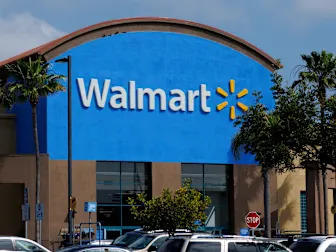It’s been a critical stretch for measuring how some of the country’s largest retailers are managing President Donald Trump ’s elevated import tariffs, as multiple big name stores share their quarterly earnings reports.
Retailers responsible for several of America’s go-to shopping destinations are among a growing chorus of companies warning that prices may be going up because of the administration’s tariff hikes.
Walmart is the latest corporation to warn that select goods could soon cost more, a disclosure that provoked anger from the president and a social media post telling the company to "eat the tariffs" and not pass on elevated costs to customers.
Tariff impacts: Walmart responds to Trump's directive to 'eat the tariffs'
Walmart says expect price hikes: Which items will get more expensive and when?
The discount retailer’s comments come as consumer sentiment slumps further this month, while one-year inflation expectations surge . American households remain concerned about the economy, as it contracted for the first time in three years during the first quarter of the year, swamped by a flood of imports as businesses and retailers raced to try to get ahead of impending tariffs. Several U.S. companies have either withdrawn, cut or withheld forecasts, citing the Trump administration's yo-yoing tariff policies as the reason behind the uncertainty.
Here’s what some of the nation’s largest, and most recognizable, retailers have said about price hikes due to tariffs.
Best Buy
In its most recent earnings report , released early March before Trump's escalated tariffs took hold in early April, Best Buy CEO Corie Barry projected that prices for U.S. consumers would rise.
"While Best Buy only directly imports 2% to 3% of our overall assortment, we expect our vendors across our entire assortment will pass along some level of tariff costs to retailers, making price increases for American consumers highly likely," Barry said in the March 4 call.
Best Buy's next earnings call is set for May 29.
Mattel
Mattel, the iconic maker of Barbie, said in its first quarter earnings report early May it plans to raise prices on American toys in direct response to the administration's new trade policies .
"The company is operating in an uncertain macro-economic environment with significant volatility, including changes in global trade policy and U.S. tariffs," the May 5 report said.
Along with Barbie, Mattel 's most recognizable franchise brands include Hot Wheels, Fisher-Price, American Girl, Thomas & Friends, Uno, Masters of the Universe, Matchbox, Monster High, Mega and Polly Pocket. Though an international brand, roughly half of Mattel's business is in the U.S., according to Chief Financial Officer Anthony DiSilvestro.
Walmart
Despite exceeding sales expectations in the first quarter, Walmart may soon increase prices for shoppers due to higher tariffs imposed by the Trump administration, according to earnings calls .
U.S. shoppers will start to see prices rise at the end of May and certainly in June, Walmart's Chief Financial Officer John David Rainey said in a CNBC interview.
Target
Target slashed its annual sales forecast on May 21, after reporting a sharp decline in quarterly sales, attributing the declines to weakened consumer confidence and a pullback in discretionary spending due to Trump's tariff war.
Target executives did not say whether they would raise prices due to tariffs when asked by reporters, according to Reuters , stating only that it continuously adjusts pricing.
Amazon said it won't list tariff costs next to products
Amazon reported May 1 a better-than-expected earnings and revenue for their first quarter, but like other large retailers in recent weeks, shied away from providing guidance amid tariff uncertainty.
Amazon CEO Andy Jassy said in a call with investors that Trump’s on-again-off-again tariffs have made it hard to predict what impact they’ll have on Amazon’s businesses, according to CNBC . The “diversity” of Amazon’s third-party seller base means that some merchants aren’t “going to pass all or any of those tariffs on to customers," he said, though some third-party Amazon sellers already raised prices or pulled back on the amount of merchandise they sell through the site.
Amazon on April 29 denied a report that it planned to include the cost of tariffs on its main retail website, which had led the White House to slam the online retailer and prompted the president to call founder Jeff Bezos.
“The team that runs our ultra low cost Amazon Haul store considered the idea of listing import charges on certain products," Amazon spokeswoman Rachael Lighty said in statement to USA TODAY . "This was never approved and is not going to happen."
Home Depot holding steady on prices
One retailer planning to keep prices stable is Home Depot, the company said May 21.
"We intend to generally maintain our current pricing levels across our portfolio,” Chief Financial Officer Richard McPhail told CNBC , adding that a majority of company's products come from the U.S.
However, the chain said tariffs could make some products unavailable, Reuters reported.
Contributing: Reuters.
Kathryn Palmer is a national trending news reporter for USA TODAY. You can reach her at kapalmer@usatoday.com and on X @ KathrynPlmr .
This article originally appeared on USA TODAY: Walmart, Best Buy: Which companies could raise prices for tariffs?


